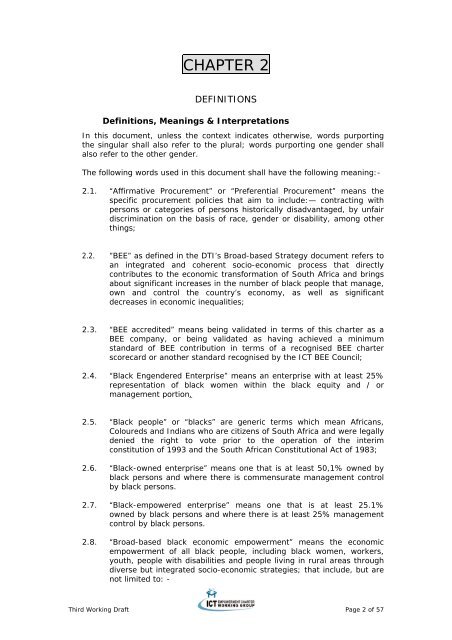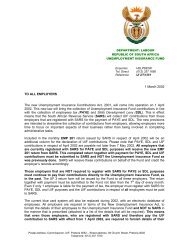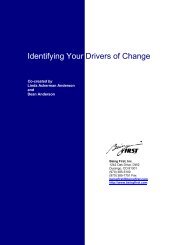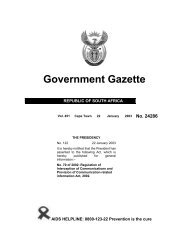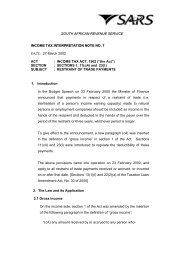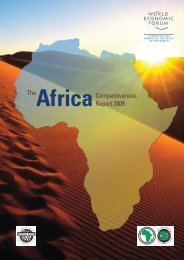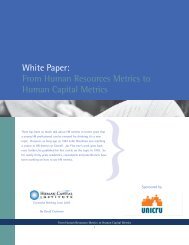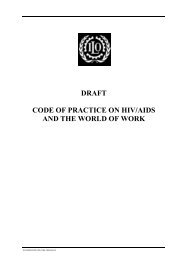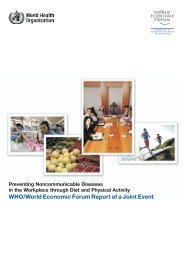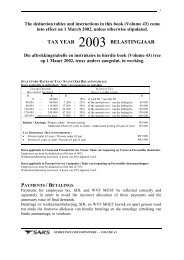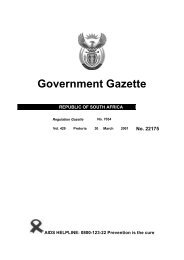THE ICT CHARTER
THE ICT CHARTER
THE ICT CHARTER
You also want an ePaper? Increase the reach of your titles
YUMPU automatically turns print PDFs into web optimized ePapers that Google loves.
CHAPTER 2<br />
DEFINITIONS<br />
2. Definitions, Meanings & Interpretations<br />
In this document, unless the context indicates otherwise, words purporting<br />
the singular shall also refer to the plural; words purporting one gender shall<br />
also refer to the other gender.<br />
The following words used in this document shall have the following meaning:-<br />
2.1. “Affirmative Procurement” or “Preferential Procurement” means the<br />
specific procurement policies that aim to include:— contracting with<br />
persons or categories of persons historically disadvantaged, by unfair<br />
discrimination on the basis of race, gender or disability, among other<br />
things;<br />
2.2. ”BEE” as defined in the DTI’s Broad-based Strategy document refers to<br />
an integrated and coherent socio-economic process that directly<br />
contributes to the economic transformation of South Africa and brings<br />
about significant increases in the number of black people that manage,<br />
own and control the country’s economy, as well as significant<br />
decreases in economic inequalities;<br />
2.3. “BEE accredited” means being validated in terms of this charter as a<br />
BEE company, or being validated as having achieved a minimum<br />
standard of BEE contribution in terms of a recognised BEE charter<br />
scorecard or another standard recognised by the <strong>ICT</strong> BEE Council;<br />
2.4. “Black Engendered Enterprise” means an enterprise with at least 25%<br />
representation of black women within the black equity and / or<br />
management portion.<br />
2.5. “Black people” or “blacks” are generic terms which mean Africans,<br />
Coloureds and Indians who are citizens of South Africa and were legally<br />
denied the right to vote prior to the operation of the interim<br />
constitution of 1993 and the South African Constitutional Act of 1983;<br />
2.6. “Black-owned enterprise” means one that is at least 50,1% owned by<br />
black persons and where there is commensurate management control<br />
by black persons.<br />
2.7. “Black-empowered enterprise” means one that is at least 25.1%<br />
owned by black persons and where there is at least 25% management<br />
control by black persons.<br />
2.8. “Broad-based black economic empowerment” means the economic<br />
empowerment of all black people, including black women, workers,<br />
youth, people with disabilities and people living in rural areas through<br />
diverse but integrated socio-economic strategies; that include, but are<br />
not limited to: -<br />
Third Working Draft Page 2 of 57


